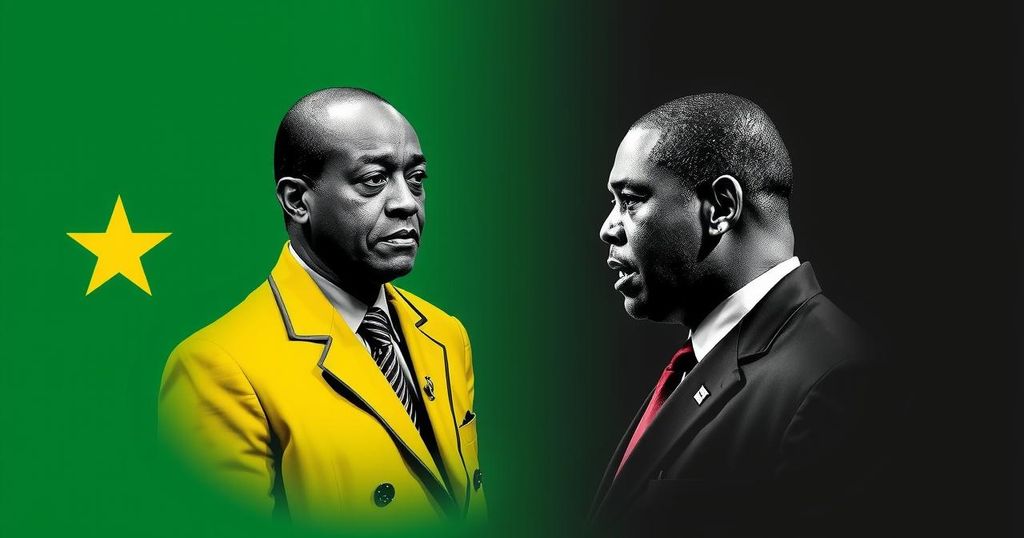Sikhala Critiques Zanu PF’s Interference in Regional Elections

Job Sikhala, chairman of the National Democratic Working Group, has condemned Zanu PF for meddling in foreign elections, particularly in Botswana and Mozambique. He accuses the ruling party of risking Zimbabweans’ reputations abroad and warns of potential backlash against them due to Zanu PF’s destabilizing actions. The allegations of electoral interference threaten the integrity of political processes in the Southern African region, raising concerns about regional security and national sovereignty.
Job Sikhala, the former Zengeza West legislator and current chairman of the National Democratic Working Group (NDWG), has issued a stern warning to Zimbabwe’s ruling party, Zanu PF, regarding their alleged interference in the electoral processes of neighboring countries, specifically Botswana. At a recent rally in Botswana, former president Ian Khama claimed that Zanu PF has dispatched agents to manipulate the forthcoming elections scheduled for October 30, 2024, where incumbent President Mokgweetsi Masisi is seeking reelection. Sikhala accused Zanu PF, led by President Emmerson Mnangagwa, of having played a role in the rigging of Mozambique’s recent elections, alleging that this action is indicative of a broader pattern of destabilization facilitated by the ruling party across the Southern African Development Community (SADC) region. He expressed concern that such actions could result in negative perceptions and hostility towards Zimbabweans in the diaspora. During his remarks, Sikhala emphasized that Zanu PF’s involvement in foreign elections undermines Zimbabweans’ standing in the region and likened their behavior to that of nations sponsoring terrorism. He referenced instances in which Zanu PF supporters participated illegally in Mozambique’s elections, diminishing the integrity of the electoral outcomes and raising questions about the legitimacy of the Frelimo party’s victory. Furthermore, Sikhala pointed out Zanu PF’s dubious efforts to influence the political landscape in Zambia, particularly in support of the former president Edgar Lungu, who was ousted by current president Hakainde Hichilema. This situation has contributed to increasing tensions within the SADC, of which Zanu PF’s actions have become a source of concern. Sikhala decried the pervasive influence of Zanu PF in the region, characterizing it as a dangerous development for the collective security of SADC member states. He warned that the party’s ongoing interference poses significant risks to the political stability and sovereignty of neighboring countries and reflects a troubling trend of regional manipulation.
The context of Job Sikhala’s remarks lies within the broader political dynamics of Southern Africa, particularly concerning Zimbabwe’s ruling party, Zanu PF. Historically, Zanu PF has been involved in protracted electoral controversies, with allegations of electoral fraud and interference in neighboring states. The region is now witnessing increased scrutiny of Zanu PF’s activities as they allegedly attempt to influence elections in Botswana, Mozambique, and Zambia, raising significant concerns about cross-border political meddling and its implications for regional stability. Khama’s rally serves as a focal point for these criticisms, illustrating rising tensions over perceived external threats to national sovereignty in Southern Africa.
In conclusion, Job Sikhala’s warnings against Zanu PF’s electoral interference highlight significant concerns regarding the party’s influence across the Southern African region. His allegations of manipulation in countries like Botswana and Mozambique underscore the growing perception that Zanu PF is jeopardizing regional stability and fueling hostility towards Zimbabweans abroad. As civic leaders and political analysts continue to observe these developments, the legitimacy of electoral processes in SADC countries hangs in the balance, heightening calls for accountability and respect for sovereign governance in the region.
Original Source: www.newzimbabwe.com







